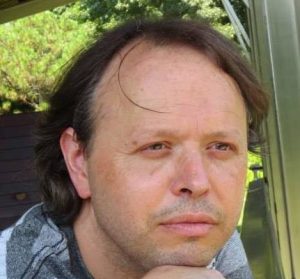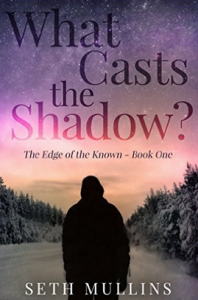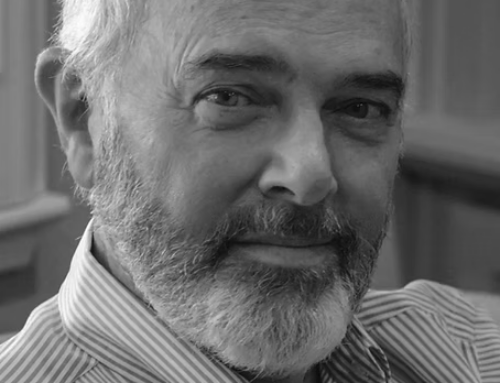 Seth Mullins first conceived of his dream to write novels in his early teens, and this one desire has stayed with him throughout all the other myriad twists and turns of life. His inspirations include methods of inner exploration such as dream-work and shamanism and his experiences as a songwriter and performing musician. He studied creative writing at Santa Fe Community College in New Mexico and Lane Community College in Oregon.
Seth Mullins first conceived of his dream to write novels in his early teens, and this one desire has stayed with him throughout all the other myriad twists and turns of life. His inspirations include methods of inner exploration such as dream-work and shamanism and his experiences as a songwriter and performing musician. He studied creative writing at Santa Fe Community College in New Mexico and Lane Community College in Oregon.
Seth has lived in Connecticut, New Mexico, Oregon and (currently) Vermont.
Tell us something about your book. The basics: what’s it about?
Brandon Chane, at the onset of the story, is an extremely gifted and wounded young musician who dreams of living and finding fulfillment through his artistic vision. But the darker side of his beliefs about himself and the world at large keep undermining his efforts and causing him suffering. What he describes in “What Casts the Shadow?”, which is essentially a fictional memoir, is a spiritual mentorship that completely altered the whole trajectory of his life.
What drove you to write this particular book?
Within our culture nowadays there’s a proliferation of written works, lectures and slogans that reiterate the idea that we create our own reality. What you don’t so often see, though, are depictions of how this can play out in one’s individual life – what it means to move through your own beliefs, thoughts and feelings and thus change your life. I wanted to dramatize the process of “reality creation” in a way that would expose all the nitty-gritty. Brandon’s quest, at every turn of the road, is reflective of his inner state.
I also wanted to explore – and question – the myth of “the gifted but doomed artist”. There’s this persistent idea that instability and great artistic vision go hand-in-hand. This hasn’t been confined to the “live fast, die young” ethic of rock’n’roll, either. You see it among the great American novelists, the renowned performers during the peak eras of jazz, the Romantic poets, the classical composers of past centuries, etc. Must great creativity always be accompanied by a tendency towards self-destruction? This is a central question posed throughout The Edge of the Known series. It’s also a myth that Brandon’s mentor, Saul Mason, constantly challenges.
What’s your writing regimen? Where do you do your writing?
I discovered quite a few years back that I think best when I’m “on the move”. My mind tends to go blank if I stare at a computer screen for too long, but then I’ll get up to wash the dishes and the whole scene that I’ve been working on will flash before my inner eyes while my hands are deep in soapy water. I rarely write for more than twenty minutes at a stretch, for this reason; but I’ll do many such sittings throughout the course of the day. If the weather’s good then I’ll wander around with a notebook or laptop, stopping wherever I can (I’m lucky to be surrounded by a lot of nature and parks).
 Who are your greatest writing influences?
Who are your greatest writing influences?
This series is influenced overall by The Seth Material by Jane Roberts and by various lore and mythology relating to shamanism. But the work that first inspired me to want to become a writer was Stephen R. Donaldson’s The Chronicles of Thomas Covenant the Unbeliever. Those books completely transformed my previous conceptions of what a story could do, of the philosophical scope that it could encompass. Some other big influences of mine – particularly for this kind of narrative – are Jack Kerouac, Charles Bukowski and Arthur Rimbaud.
Is the book in any one particular genre? Is it a genre that’s familiar to you?
It’s categorized as “metaphysical fiction”, which can be a weighty tag, unfortunately. I also refer to it as spiritual memoir. Some well-known works in that genre include The Teachings of Don Juan and The Way of the Peaceful Warrior, but the difference here is that mine is the ‘memoir’ of a fictional character.
How did you come to self-publish? Did you try to get published traditionally?
Brandon narrates his own journey throughout the course of this series, and his voice is oftentimes rough around the edges. It’s mostly because I believed that those rough edges were crucial, and I didn’t want to risk them being smoothed over in the editing process, that I opted to self-publish.
Would you self-publish again?
I would consider working with a traditional publisher if it would afford me an opportunity for wider exposure without my having to compromise the integrity of the story. I do appreciate having full creative control over my work. The trade-off for that, of course, is that you have to shoulder the work and expense of promotion yourself.
What’s next on the horizon for you as an author?
I’m not sure how far this series will run. I have a spontaneous approach to crafting stories; I try to ‘step out of the way’ and let the Muse lead without outlining things in advance. But it will require at least another book or two to bring this saga to a satisfactory conclusion. That ought to keep me occupied for a couple of years.
Links
Author Site
Facebook
Amazon
Goodreads
Get an Editorial Review | Get Amazon Sales & Reviews | Get Edited | Get Beta Readers | Enter the SPR Book Awards | Other Marketing Services






















Leave A Comment